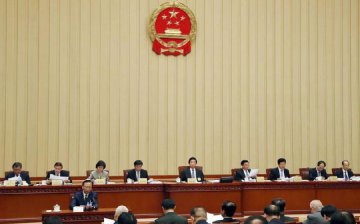WASHINGTON, March 3 (Xinhua) -- The U.S. Federal Reserve, in a surprise move, lowered the target range for the federal funds rate by 50 basis points on Tuesday, as the COVID-19 outbreak poses "evolving risks" to economic activity.
"In light of these risks and in support of achieving its maximum employment and price stability goals," the Federal Open Market Committee (FOMC), the Fed's policy-setting body, announced in a statement that it decided to cut the benchmark interest rate by 0.5 percentage point, putting it in a range of 1 percent to 1.25 percent.
Shortly after, Federal Reserve Chairman Jerome Powell said in a press conference that since the January FOMC meeting, the spread of the coronavirus has brought new challenges and risks. "The magnitude and persistence of the overall effects on the economy, however, remain highly uncertain, and the situation remains a fluid one," said Powell.
"Against this background, the Committee judged that the risks to the U.S. outlook have changed materially," said the U.S. Fed chief. "In response, we have eased the stance of monetary policy to provide some more support to the economy."
Krista Schwarz, an assistant professor of finance at the Wharton School of the University of Pennsylvania, told Xinhua that the Fed's half-point rate cut is "substantial," in that it is the largest magnitude of policy target rate cut since the fall of 2008, and it is the first inter-meeting cut since the financial crisis.
"This action is pre-emptive in nature, against the backdrop of the virus' potential effect on U.S. growth as firms cut earnings forecasts and draw down inventories due to disruptions in supply chains," she said.
Schwarz added that the Fed's rate cut clearly does not affect the adverse supply shock, but it might mitigate the virus-related drop in demand.
Noting that the outbreak will require a "multi-faceted" response, the Fed chairman told reporters that the central bank doesn't have all the answers, urging healthcare professionals and fiscal authorities to take measures they deem appropriate.
"But we do believe that our action will provide a meaningful boost to the economy," said Powell. "More specifically, it will support accommodated financial conditions and avoid a tightening of financial conditions which can weigh on activity and will help boost household and business confidence."
The emergency rate cut, however, didn't seem to have calmed investors. Stocks fell sharply in volatile trading, with the Dow Jones Industrial Average diving more than 900 points, after a short-lived surge earlier in the session. The yield on 10-year U.S. Treasuries dropped below 1 percent for the first time.
U.S. President Donald Trump, who has repeatedly criticized the central bank, voiced his discontent on Twitter. "The Federal Reserve is cutting but must further ease and, most importantly, come into line with other countries/competitors," Trump said. "More easing and cutting!"
Eric Winograd, senior economist at AllianceBernstein (AB), was quoted by MarketWatch as saying that he thought the Fed would lower rates again in two weeks at its next policy meeting. "If the Fed is worried enough to cut 50 today, I expect them to cut more at their March 18 meeting," Winograd said.
Earlier in the day, finance ministers and central bank governors of the Group of Seven (G7) industrialized nations said in a joint statement issued after an emergency conference call that they will "use all appropriate policy tools" in the efforts to mitigate the economic impact from the ongoing COVID-19 outbreak.
"That is a statement of general support," said Powell. "And I think it's up to individual countries, individual fiscal policies and individual central banks to do what they are going to do."
The U.S. Fed chair added that it is possible there will be some "more formal coordination" as a move forward.
Schwarz noted that continental Europe and Japan are more constrained in cutting policy rates due to their present negative rate stance, and so the U.S. rate cut is "helpful more broadly."
"In light of these risks and in support of achieving its maximum employment and price stability goals," the Federal Open Market Committee (FOMC), the Fed's policy-setting body, announced in a statement that it decided to cut the benchmark interest rate by 0.5 percentage point, putting it in a range of 1 percent to 1.25 percent.
Shortly after, Federal Reserve Chairman Jerome Powell said in a press conference that since the January FOMC meeting, the spread of the coronavirus has brought new challenges and risks. "The magnitude and persistence of the overall effects on the economy, however, remain highly uncertain, and the situation remains a fluid one," said Powell.
"Against this background, the Committee judged that the risks to the U.S. outlook have changed materially," said the U.S. Fed chief. "In response, we have eased the stance of monetary policy to provide some more support to the economy."
Krista Schwarz, an assistant professor of finance at the Wharton School of the University of Pennsylvania, told Xinhua that the Fed's half-point rate cut is "substantial," in that it is the largest magnitude of policy target rate cut since the fall of 2008, and it is the first inter-meeting cut since the financial crisis.
"This action is pre-emptive in nature, against the backdrop of the virus' potential effect on U.S. growth as firms cut earnings forecasts and draw down inventories due to disruptions in supply chains," she said.
Schwarz added that the Fed's rate cut clearly does not affect the adverse supply shock, but it might mitigate the virus-related drop in demand.
Noting that the outbreak will require a "multi-faceted" response, the Fed chairman told reporters that the central bank doesn't have all the answers, urging healthcare professionals and fiscal authorities to take measures they deem appropriate.
"But we do believe that our action will provide a meaningful boost to the economy," said Powell. "More specifically, it will support accommodated financial conditions and avoid a tightening of financial conditions which can weigh on activity and will help boost household and business confidence."
The emergency rate cut, however, didn't seem to have calmed investors. Stocks fell sharply in volatile trading, with the Dow Jones Industrial Average diving more than 900 points, after a short-lived surge earlier in the session. The yield on 10-year U.S. Treasuries dropped below 1 percent for the first time.
U.S. President Donald Trump, who has repeatedly criticized the central bank, voiced his discontent on Twitter. "The Federal Reserve is cutting but must further ease and, most importantly, come into line with other countries/competitors," Trump said. "More easing and cutting!"
Eric Winograd, senior economist at AllianceBernstein (AB), was quoted by MarketWatch as saying that he thought the Fed would lower rates again in two weeks at its next policy meeting. "If the Fed is worried enough to cut 50 today, I expect them to cut more at their March 18 meeting," Winograd said.
Earlier in the day, finance ministers and central bank governors of the Group of Seven (G7) industrialized nations said in a joint statement issued after an emergency conference call that they will "use all appropriate policy tools" in the efforts to mitigate the economic impact from the ongoing COVID-19 outbreak.
"That is a statement of general support," said Powell. "And I think it's up to individual countries, individual fiscal policies and individual central banks to do what they are going to do."
The U.S. Fed chair added that it is possible there will be some "more formal coordination" as a move forward.
Schwarz noted that continental Europe and Japan are more constrained in cutting policy rates due to their present negative rate stance, and so the U.S. rate cut is "helpful more broadly."






















Latest comments